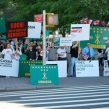
Lessons For Today’s Circassian Activists in the Diaspora? (Part Three)
Publication: Eurasia Daily Monitor Volume: 8 Issue: 80
By:

Following the defeat of Nazi Germany in the Second World War, the Soviet government negotiated the massive handover of many of USSR citizens – even those who had emigrated before the war. Many of the Soviet citizens who found themselves in the West by the end of the war were prosecuted back in the USSR, regardless of their status. Aslan Kazakov hails the arrests of collaborators made by the Kabardino-Balkarian branch of the Soviet security services. Davletgeri Tavkeshev and Kasym Beshtokov, the Circassian leaders of the “national government of Kabardino-Balkaria” sponsored by the Germans, were arrested and executed. The Turkic-speaking, Karachay-Balkar part of the pro-German leadership of Kabardino-Balkaria and Karachaevo-Cherkessia, was luckier and consequently avoided their Circassian colleagues’ fate, having found refuge in the United States, West Germany and elsewhere in the West (www.dslib.net).
While Kazakov dismisses the German-backed government of Kabardino-Balkaria as a “puppet,” it is ironic that the communist government of the republic in Stalin’s USSR equally deserved being called a “puppet.” There were revolts against Soviet rule in Kabardino-Balkaria along and other North Caucasian regions prior to the WWII that were cruelly suppressed.
Kazakov extensively describes the subversive work of a Circassian Soviet agent codenamed “P” whom the Kabardino-Balkarian branch of the Soviet security services allegedly implanted in the North Caucasian and Russian émigré organizations at the end of World War II. “P” reportedly supplied valuable information about the émigré organizations and their links to Western security services, and even obstructed their work. According to Kazakov, the Western security services were interested in the North Caucasian émigrés because of their uncompromising stance against the USSR that made them useful for the purposes of the unfolding Cold War. “P” provided a list of the names of 64 people who were collaborating with American and British intelligence services.
It was probably feasible for “P” to find out who worked for which security services among the North Caucasian, Russian, Central Asian and other émigrés, but the extensive details provided by Aslan Kazakov suggest the usual Soviet spy-mania may have played a part. This means, that “P” ascribed all the émigrés’ contacts with the Westerners to “work with security services.” For example, Kazakov suggests that the Institute for the Study of the History and Culture of the USSR was a spy organization that analyzed economic, political and military data received from the USSR. Any organization or person in the West that collected, analyzed or interpreted almost any kind of information about the USSR was reflexively assumed to be working with the Western security services.
Kazakov writes that American and British security services preferred to supplant the German spy rings that they created with the North Caucasians with their own men. While the Germans were still overseeing their activities, some North Caucasians protested against that. “P” may have contributed to these protests that allegedly forced the Americans to abandon plans to support the Caucasian People’s Movement. “P” worked to include arbitrary, unrealistic goals in the statutes of the North Caucasian émigré organizations in order to preclude them from receiving financial support from Western governments.
One of the most curious examples of the “secret” organizations that “P” uncovered was a Masonic Lodge called Order Senate. The lodge reportedly consisted of 500 members, 300 of whom were Circassians. “P” managed to obtain the addresses and personal information for all 500 members who lived in the US, West Germany, Turkey, Syria, Jordan and other countries.
Kazakov reveals two other Soviet agents from Kabardino-Balkaria, designated as “T” and “N,” but their achievements were described as being mainly confined to “making useful contacts.” “N” was dispatched to the Middle East as late as the early 1950’s, when the North Caucasian émigré movement was waning. It is quite remarkable how the Soviets tried to make use of the fact that a large diaspora of Circassians lived abroad by sending out spies from Kabardino-Balkaria.
The issue of the Sochi Olympics in 2014 is politically important to Moscow, and the Circassian diaspora abroad seems determined to use this event to attract the world’s attention to what it considers to be an injustice committed by the Russians against the Circassians. It is very likely the Russian security services followed Kazakov’s advice “to use the Soviet experience” to infiltrate the Circassian organizations abroad and curb and obstruct their activities in other ways.
Kazakov’s dissertation once again puts on display the proverbial conservatism of the Russian security services, which still think of the past in profoundly Soviet terms. The famous Russian writer of Ossetian origin, Gaito Gazdanov, is listed as “an émigré enemy,” apparently for his work for Radio Liberty in France. Abdurakhman Avtorkhanov, the most famous North Caucasian historian and Sovietologist of Chechen origin, is dismissed as a mere “anti-Soviet spy.”
Kazakov’s study provides at least two useful tips for the Circassian diasporas that are actively working on the Sochi Olympics issue. First, the Russian security agencies are prone to follow in the Soviet security services’ footsteps, so their actions can be predicted from the Soviet experience to a certain extent. Second, dispatching undercover spies from the Circassian-populated republics of the North Caucasus abroad is likely still to be deemed an effective tactic by the contemporary Russian security services.




